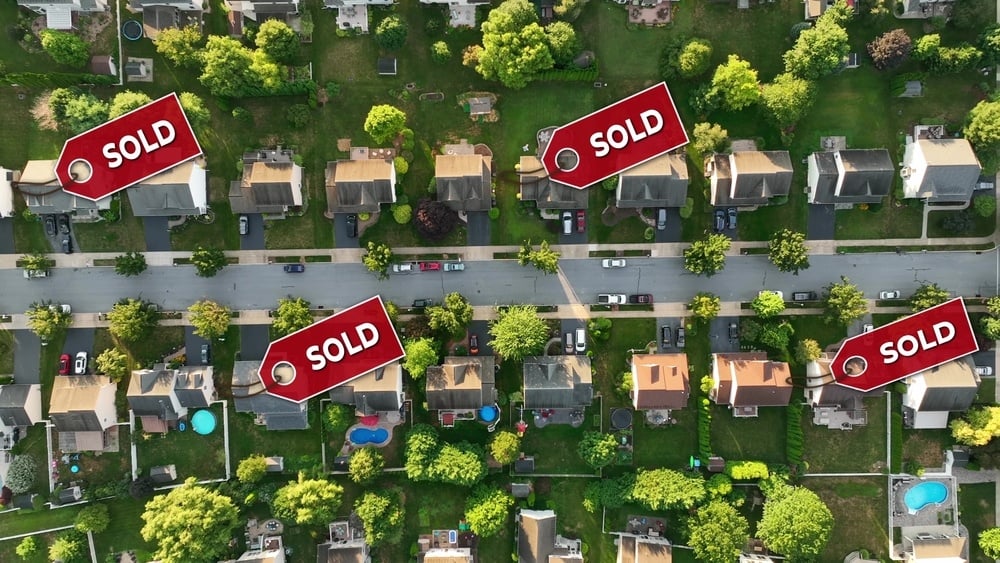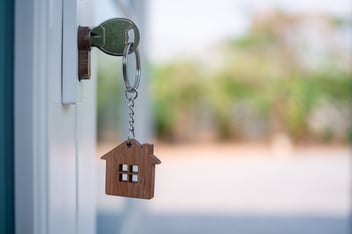
When listing your home for sale, determining the right listing price is crucial for securing a successful sale. Many sellers assume they can start high and lower the price later, but this can backfire.
Overpricing your home can cause it to linger on the market and cause potential buyers to question its value. According to a recent HomeLight survey, 75% of sellers are asking for more than their homes could reasonably be worth, which deters buyers and prolongs the selling process.
Let’s explore the importance of accurate pricing, factors influencing the right asking price, common pricing mistakes, and how a knowledgeable real estate agent can guide you to a successful sale.
The Importance of Pricing Your Home Correctly
Pricing your home correctly from the start can make the difference between a quick, profitable sale and months of frustration.
Some sellers assume that listing at a lower price will spark a bidding war, but that strategy doesn’t always pay off. When a home is significantly underpriced, potential buyers may assume there’s something wrong with it—such as hidden structural issues or an urgent need for a quick sale. This can lead to lowball offers, and you may leave money on the table.
On the other hand, if your house's asking price is too high, it can cause your home to sit on the market longer than necessary. According to Redfin, homes that require a price drop take twice as long to sell as those priced correctly from the beginning. The longer a home lingers, the more buyers wonder if something is wrong with it, reducing negotiation leverage.
To avoid these pitfalls, it is always best to work with an experienced real estate agent. They can help you confidently price your home based on market conditions, comparable sales, and buyer demand, maximizing your chances of a smooth and successful sale.
3 Factors That Influence the Right Asking Price for Your Home
Determining the ideal asking price for your home requires a deep understanding of market trends, buyer behavior, and your home’s unique features. Here are three key factors that influence asking prices:
1. The State of the Housing Market
Real estate markets fluctuate based on economic conditions, local housing supply, and buyer activity. A seller’s market—where demand and inventory are low—often leads to bidding wars and higher sale prices. Conversely, a buyer’s market means more homes are available, creating competition and forcing sellers to be more strategic with pricing.
Other key market factors that impact home prices include:
- Location: Homes in desirable neighborhoods (strong schools, low crime, amenities) generally have higher values.
- Seasonal trends: Spring and summer are peak selling seasons with higher buyer demand. Fall and winter are often slower, requiring more competitive pricing.
2. Buyer Purchasing Power & Mortgage Rates
Mortgage rates directly impact how much home buyers can afford. When rates are low, buyers have more purchasing power and can afford higher prices. When rates rise, monthly payments become more expensive, limiting what buyers will spend.
Here’s what this means for sellers:
- Pricing should reflect what buyers can afford, not just market value.
- Overpricing in a high-rate environment can lead to longer selling times and price reductions.
3. The Home Itself: Condition, Upgrades & Features
A home’s condition and unique features significantly influence its value. Modern updates, energy-efficient systems, and move-in-ready appeal can justify a higher asking price, while outdated features or necessary repairs may require a more competitive price.
Features that don’t always justify a higher price are:
- Over-personalized renovations
- Luxury upgrades that don’t match buyer demand
- Improvements that exceed neighborhood norms

3 Most Common Pricing Mistakes Sellers Make
Pricing mistakes can cost you time and money. Here are sellers' most common pricing mistakes and how to avoid them.
1. Overpricing from the Start
Many sellers assume they can start high and lower the price if needed, but this can backfire.
- Why it’s a problem:
- Leads to low buyer interest and fewer showings.
- Homes that sit on the market too long raise red flags for buyers.
- Often results in multiple price reductions, making the home appear less desirable.
- How to avoid it:
- Work with a real estate agent to set a competitive asking price based on data, not emotions.
- Price your home realistically from the start to generate strong initial interest.
2. Ignoring Market Comparisons
Sellers sometimes price their homes based on what they think it’s worth, rather than what the market supports.
- Why it’s a problem:
- Buyers and agents look at comparable sales to determine fair market value.
- Buyers will move on to better-priced options if your price is significantly higher than similar homes.
- How to avoid it:
- Review recent sales of similar homes in your area to understand pricing trends.
- Consider location, condition, and features to ensure your price aligns with market realities.
3. Refusing to Negotiate
Every seller wants top dollar, but rejecting reasonable offers can cause a sale to fall through.
- Why it’s a problem:
- In a shifting market, buyers expect some flexibility in pricing and terms.
- Holding out for an unrealistic number can result in missed opportunities and a longer time on the market.
- How to avoid it:
- Be open to negotiating prices, closing costs, or other terms to keep buyers engaged.
- Trust your agent’s expertise—they can help determine when to counter, accept, or hold firm.

How a Real Estate Agent Helps You Price Your Home Correctly
Setting the correct asking price is one of the most critical steps in selling your home, and working with an experienced real estate agent can make all the difference. Here’s how an agent can set your home sale up for success:
They Will Conduct a Comparative Market Analysis (CMA)
A Comparative Market Analysis (CMA) is a detailed report evaluating similar homes recently sold in your area. This helps determine a fair market value for your property based on:
- Recent sales of comparable homes (size, location, condition, and features).
- Active listings to see how your home stacks up against the competition.
- Market trends and seasonal patterns that may impact buyer demand.
They Know Proven Pricing Strategies to Generate Offers
Beyond setting a competitive price, an agent can help position your home for maximum interest and multiple offers by:
- Suggesting a pricing sweet spot that appeals to buyers while maximizing your return.
- Recommending strategic price adjustments if market conditions shift.
- Guiding you on whether to price slightly below market value to spark a bidding war or list at market value for steady, serious offers.
They Help Homeowners Avoid Pricing Mistakes
Overpricing or underpricing your home can lead to costly mistakes. An agent helps you avoid:
- Overpricing, which can cause your home to sit on the market too long.
- Underpricing, which could result in leaving money on the table.
- Emotional pricing, where personal attachment leads to unrealistic expectations.

Sell Smarter with BlueWest Properties
Are you thinking of selling your home? Our agents are equipped with expert pricing strategies and personalized guidance to help you confidently sell your West Michigan home. Contact BlueWest Properties today!


